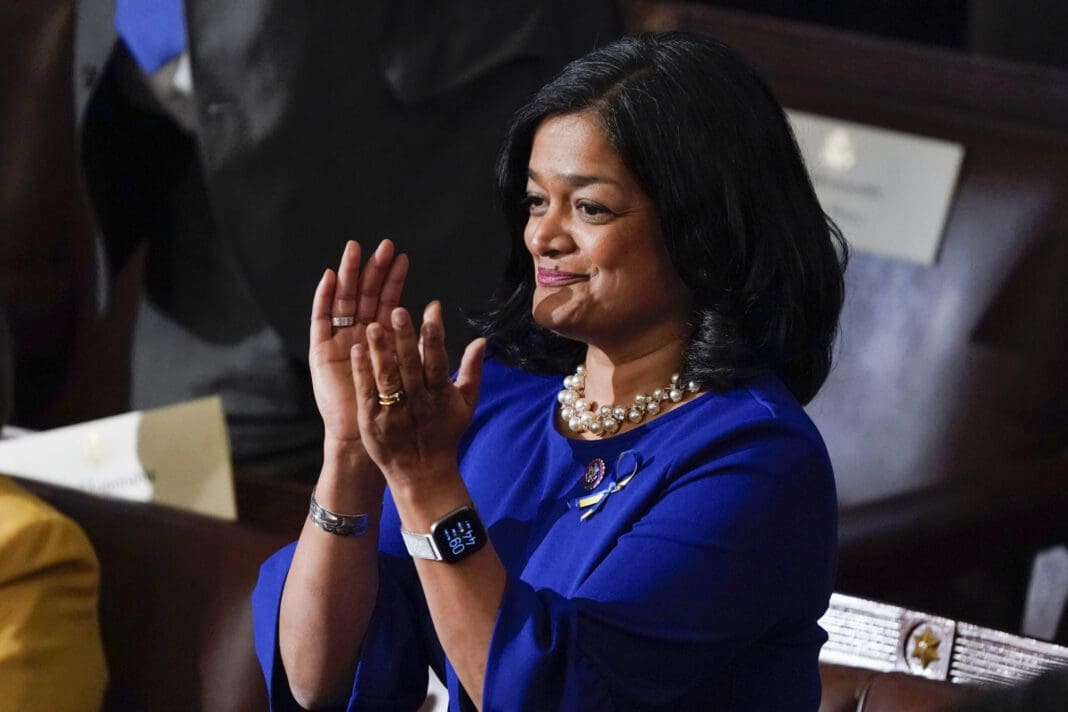The end of Citizens United? Jayapal introduces bill to curb corporate electoral spending
Since the 2010 U.S. Supreme Court ruling in Citizens United v. Federal Election Commission, political spending and dark money in elections have soared to record highs.

Rep. Pramila Jayapal (D-WA) introduced an amendment to the U.S. Constitution last month that would kneecap corporate political spending in elections.
The We the People Amendment would stipulate that protection of free speech under the First Amendment to the Constitution applies only to what it calls “natural persons,” effectively reversing the U.S. Supreme Court’s 2010 decision in Citizens United v. Federal Election Commission, in which it ruled that political spending by corporations is protected speech and cannot be restricted by the government.
The Citizens United ruling allows corporations and special interest groups to spend an unlimited amount of money on independent expenditures: television, radio, and digital ads meant to support or oppose a candidate and influence an election. Many of these groups are known as dark money groups because they don’t have to disclose where their funding comes from under federal tax law.
In the years since the ruling, unfettered political spending by corporations, special interests, and dark money groups has skyrocketed. In 2012, the first federal election cycle after the 2010 ruling, political spending nearly doubled from $3.6 billion to $6.2 billion, according to data compiled by Open Secrets. The last few election cycles have shattered spending records; the 2020 presidential cycle was the most expensive in U.S. history at $14.4 billion, and the 2022 midterm elections were the most expensive Congressional election cycle on record at $8.9 billion.
“Corporations are not people and money is not speech,” Jayapal said in a statement. “In every election cycle since the disastrous Citizens United decision, we have seen more and more special interest dark money poured into campaigns across the country.”
It’s not the first time a member of Congress has introduced a resolution proposing the We the People Amendment. The amendment was first introduced in 2013 by former Minnesota Rep. Richard Nolan. Since then, versions of the amendment were reintroduced by Nolan in 2015 and 2017, and then again by Jayapal in 2019. But the resolution has struggled to gain the support it needs in the House in order to move forward. The 2019 version of the resolution had 74 co-sponsors, the most it’s had since it was first introduced. It was referred to the Judiciary Committee’s Subcommittee on Constitution, Civil Rights, and Civil Liberties, but never brought to the floor for debate or a vote.
The wave of dark money unleashed by the Citizens United decision has transformed elections into increasingly expensive affairs.
Government watchdog groups and election reform advocates who track how candidates that benefit from dark money groups and corporate PACs are then beholden to those groups’ agendas have raised ethical concerns about the vast amount of money being poured into elections.
“Each year, we see more dark corporate money pouring into our elections, letting billionaires and corporate America buy influence and power in Washington,” Tiffany Muller, president of the End Citizens United advocacy group, said in January after the Democracy For All Amendment, which would overturn Citizens United, was introduced in the House by Jayapal and Democratic Reps. Adam Schiff (CA), Dean Phillips (MN), and Jim McGovern (MA).
In 2015 in Wisconsin, for example, Republican Gov. Scott Walker supported a deal to provide $250 million in public funding to build a new arena for the state’s NBA team the day after the son of one of the team’s chief investors donated $150,000 to a super PAC supporting Walker’s presidential campaign.
By funding campaigns through independent expenditures, dark money groups are able to pay for provocative and controversial ads to help a candidate without violating FEC laws that prohibit coordination between campaigns and PACs. In the 2022 midterms, Open Secrets reported, Citizens for Sanity, a dark money group with ties to officials in former President Donald Trump’s administration, paid for a series of racist and transphobic ads targeting Democratic candidates in key battleground states, including Pennsylvania and New Hampshire.
In recent years, however, dark money supporting GOP candidates and causes has flowed away from federal elections and into state elections after recent U.S. Supreme Court decisions gave states the power to decide how to regulate civil liberties, reproductive rights, and voting rights for themselves. The March state Supreme Court race in Wisconsin, for example, was the most expensive state judicial election in U.S. history; a majority of the $21.34 million invested in the race was spent by outside groups on independent expenditures supporting Daniel Kelly, the conservative candidate who lost the election.
Much of the corporate money supporting Kelly came from Dick and Liz Uihlein, the billionaire owners of the Uline shipping and business supply company, who have emerged among the most prominent GOP megadonors in recent years. A super PAC almost entirely funded by Uihlein spent millions of dollars on controversial ads attacking Judge Janet Protasiewicz, the liberal candidate who won the seat.
“The exponential growth of corporate power and corrupting political influence from huge sums of money flooding elections can only be solved with a systemic solution that is equivalent in scale to these systemic problems — the We the People Amendment, which will end all corporate constitutional rights and money as free speech,” Dolores Guernica, the legislative co-director of Move to Amend, a nonprofit group that advocates against corporate spending in politics, said in a statement posted to Jayapal’s website.
Published with permission of The American Independent Foundation.
Recommended

U.S. House Speaker Johnson says IVF should be protected — just not by Congress
U.S. House Speaker Mike Johnson said Thursday that it’s up to states and not Congress to preserve access to in vitro fertilization, weighing in on a growing national debate and campaign issue.
By Jennifer Shutt, States Newsroom - March 14, 2024
Biden calls for expanded child tax credit, taxes on wealthy in $7.2 trillion budget plan
President Joe Biden released his budget request for the upcoming fiscal year Monday, calling on Congress to stick to the spending agreement brokered last year and to revamp tax laws so that the “wealthy pay their fair share.”
By Jennifer Shutt, States Newsroom - March 11, 2024
Telehealth abortions on the rise since Dobbs, new report shows
Researchers studying national abortion trends found that in the 15 months since Roe v. Wade fell, abortion rates remained elevated despite more limited access throughout the U.S., according to the Society of Family Planning’s latest #WeCount report published Wednesday.
By Sofia Resnick, States Newsroom - February 28, 2024









































































